Manuscript Studies at Notre Dame: A Jewel in the Crown
Hundreds of students walk in and out of the Hesburgh Library daily without ever considering a unique collection located right on the main floor: Rare Books and Special Collections. But to the initiated, this wing represents one of the finest collections of original manuscripts and facsimiles in North America and is one of several reasons that Notre Dame’s Medieval Institute is the premier American institution at which to pursue manuscript studies, known in the field as codicology, and its sister subject, paleography, or the study of ancient handwriting.
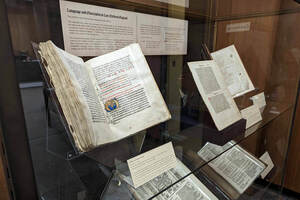
A trip to RBSC, whether as an exciting part of an undergraduate seminar or as the long-anticipated beginning of doctoral research, is often an encounter that changes a student’s academic trajectory forever. The direct and physical encounter with the past afforded by RBSC manuscripts, combined with the knowledge and skills of the Medieval Institute faculty, offer students of medieval studies an unparalleled education in the medieval world.
Medieval Studies Librarian Dr. Julia A. Schneider emphasizes the foundational importance of working with these collections: "The study of medieval manuscripts and book culture are necessary to gain perspective on anything and everything touched by the transmission of knowledge during the Middle Ages. Learning the necessary skills for the study of handwritten and early printed texts (paleography and codicology) helps scholars and students grasp the cultural impact of the written word, adding immeasurable depth to their understanding of their own disciplines."
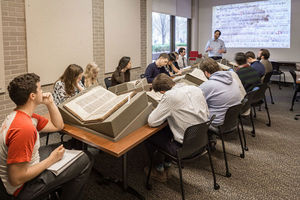
Dr. David T. Gura, Curator of the University’s Ancient and Medieval Manuscripts and Associate Professor of Classics and Medieval Studies, explains the dual strengths of manuscript studies at the Medieval Institute: “Notre Dame is uniquely positioned as the best institution in North America for manuscript studies of both Latin and Byzantine book cultures thanks to the manuscript collections and to the community of scholars and practitioners in a variety of disciplines.”
This combination of highly skilled faculty and stellar collections set Notre Dame apart from its peers in the field. As Dr. Megan J. Hall (Ph.D. '16), Assistant Director of the Medieval Institute, describes it, “When applying for graduate programs, I immediately sought out Notre Dame, as I knew it was the absolute best place for codicology and paleography, tools I needed to be an expert in so I could produce scholarship in my field of medieval English literature. I use these tools every day in my work on medieval women's literacy and learning in England.”
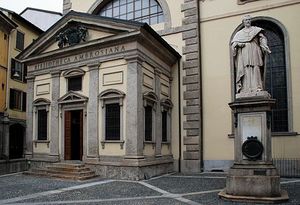
In addition to the medieval resources available in RBSC on the main floor, the Medieval Institute library, located on the seventh floor, itself houses several resources of special interest to medievalists. Collections of manuscript microfilms include the Ambrosiana Collection, thanks to a partnership with the Biblioteca Ambrosiana in Milan. (A fun fact: this partnership between Notre Dame and the Ambrosiana was the result of a collaborative effort between Fr. Theodore Hesburgh, the University's president from 1952 to 1987, and Pope Paul VI.)
In addition to its Main, Byzantine, and Universities Reading Rooms, the institute also has its own dedicated Paleography Reading Room. Dr. Schneider points out the uniqueness of this room: "Our Paleography Collection is a treasure house of almost everything one would need to prepare for the study of particular manuscripts, types of scripts and writing, materials for book production and early print. It provides our students with the resources they need within easy reach of our other collections." All of these collections are, of course, made possible through the support of generous friends, for whom the Medieval Institute is continually grateful.
Given the Medieval Institute’s unique resources in manuscript studies, medieval studies students graduate with robust skills in codicology and paleography, which prepare them for further research in the field. Both undergraduate and graduate students of the Medieval Institute take classes and pursue independent research projects or dissertations on topics relating to manuscript studies. The institute offers manuscript studies courses in multiple languages—Latin, Greek, and medieval vernaculars—in addition to world-class training in paleography. The Medieval Institute is also the only place outside of Europe to offer diplomatics, the study of documents and charters. Much of this training is made possible by the high-quality facsimiles and original manuscripts held in Rare Books and Special Collections.
Dr. Schneider reflects on these holdings: "Our collections include many medieval manuscripts [and] many original-format facsimiles of medieval manuscripts, [which] allow us to introduce our users directly to some of the greatest treasures of Western, Byzantine, and Mediterranean cultures. Our students and faculty can view, study, and examine facsimiles, for example, of the Book of Kells, Charlemagne's Coronation Gospels, or the Codex Calixtinus (a book that functions as the earliest guide for pilgrims on the way to Santiago de Compostela, Spain)—works that they have read about or whose history they have studied but could never touch in person due to their high value and potential fragility as heritage objects. Further, we use these as a way to anchor understandings of the history of written culture, not only for Notre Dame students, but also for students at other local schools, including those in primary and secondary schools."
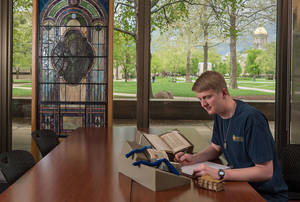
Thanks to these fine resources and robust training, many MI students note that studying manuscripts is one of the most formative experiences of their time at Notre Dame. Erica Sestak (B.A. '19), a Medieval Studies major, gained the ability to work directly with library manuscripts as a foundation for her interdisciplinary research project, sponsored jointly by the Department of Physics and Rare Books and Special Collections, that analyzed the pigments of fourteenth- and fifteenth-century Psalters held in RBSC. Luke Donahue (B.A. '17), a Medieval Studies minor, made use of Rare Books and Special Collections for his senior honors thesis on Marian prayers in medieval Bavaria, receiving an Honorable Mention in the senior/honors thesis category of the Undergraduate Library Research Award (ULRA).
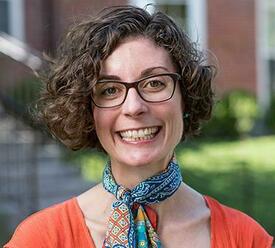
Institute graduate students have also found their careers greatly enriched by Notre Dame's manuscript resources. Dr. Katie Bugyis (Ph.D. '15), a graduate of the MI doctoral program and an Associate Professor in Notre Dame's Program of Liberal Studies, cites the manuscript studies training she received as crucial to her future career: “The research skills that I acquired as a graduate student at Notre Dame are what have advanced me to this point in my scholarly career. I would wager that there is no other program in Medieval Studies in the world that prepares its graduate students as rigorously in paleography, codicology, various ancient and modern languages (especially Latin), and historiography as Notre Dame's Medieval Institute does.”
Professor Bugyis's first book, The Care of Nuns: The Ministries of Benedictine Women in England during the Central Middle Ages (New York: Oxford U P, 2019) was awarded the American Society of Church History's 2020 Frank S. and Elizabeth D. Brewer Prize, which annually honors outstanding scholarship in the history of Christianity by a first-time author. Its first printing sold out and it was reprinted in the same year.
Manuscript studies at the Medieval Institute also qualifies graduates to take unique and prestigious jobs within the field. Institute graduate Stephen Metzger (Ph.D. '13) now holds the position of Scriptor at the Vatican Library. In reflecting on how his MI education prepared him for his current role, Dr. Metzger wrote, “I was introduced in a deep way to the bibliography of manuscripts, codicology, paleography, philosophy, theology, and even law. All of this together will be indispensable for my work.” Similarly, an MI education provided Dr. Nicole Eddy (Ph.D. '12) with the necessary skills for her role as Managing Editor for the Medieval Library series at the prestigious Dumbarton Oaks Research Library and Collection.
While institute education sets students up for stellar scholarly careers, the heart of manuscript studies at the Medieval Institute is a profound engagement with the past which continues to attract many students to the Medieval Institute. As Dr. Gura notes, "The encounter with primary sources can be a transformative experience for students, and I've spent my career building the collections at Notre Dame to provide such an experience." Notre Dame’s Medieval Institute, working with RBSC, will continue to provide just such transformative experiences for its undergraduate and graduate students, thanks to generous support of its manuscript studies resources.